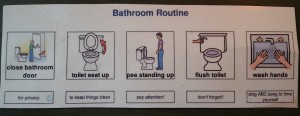Coming Alongside the Hurt: Worshiping God Together
Posted on March 9, 2015

Jason Rodenbeck
My wife is Wonder Woman. She really, really is. I’m the luckiest guy I know. As unhealthy as my first marriage was, as horribly matched as I was to my first wife, my current marriage and match are as good for me as they could be. And, I dare say, maybe they’re pretty good for her, too. We are as equal as we can be when it comes to the ways we think about things, our values, our feelings, our interests. She’s like a female me and I’m like a male her. How many people can really say that?
On top of it, she works like a fiend. For the past several years I worked three jobs to make ends meet and was at the point in my life where it was affecting my health. Recently she’s taken a new job which required a cross-country move, and part of the reason she agreed to do it was to give me a chance to recoup a little bit. Now, she’s the one working and working (and I’m doing my best to try to support her).
But it’s hard sometimes because there are things she suffers that I simply don’t know how to help. See, my stepson is autistic. He’s…pretty…autistic. I know, that’s not the proper language for it, but holy smokes, sometimes it’s just overwhelming.
In some ways, having an autistic kid in the house is easy. He doesn’t require a lot of attention throughout the day. He doesn’t need to be driven to a hundred ball games a week. He doesn’t require rides to a friend’s house to play in a garage band. He’s not interested in most of the things that other kids are interested in. He prefers to stay in his own little world and not be bothered. There are days when I think, “I can live with that today.”
In other ways, though, having an autistic kid in the house is a living nightmare. And it’s completely because he prefers to stay in his own little world and not be bothered. This means that, a lot of the time, he’d rather watch videos on his iPad than brush his teeth or do any of the little things we all do every day without thinking to take care of ourselves. It means that sometimes, he feels that watching where he pees is just more trouble than it’s worth. It means that he must constantly be watched and pushed to do the things for himself that most of us don’t even think about. It means that, at fourteen, he’s liable to leave for school with his pants and shirt on backwards or inside out.
And the thing is, if you don’t push him to do what he should, he’s not going to. Because of the overwhelming neural stimulation he deals with all the time, his whole worldview is predicated on doing whatever the easier thing is at any given moment.
Now, if you’re the parent of a typical child, I know what you’re thinking because I’ve said it, too. You’re thinking, “Yeah, but that’s every kid.” Trust me. You’re wrong. It’s different. It’s so, very, profoundly different.
See, that Noah can do anything is completely because his mother cared and worked so that it would be so. His autism was so profound as a toddler that she was told he would never speak. She pushed him to learn. Countless, frustrating hours pushing him to look at flash cards when he relentlessly resisted, taping forks to his hands so he could learn to feed himself, finding ever new and creative ways of helping him cope with his sensory issues. Years of working extra jobs so that she could afford to get him basic therapies which were extravagantly expensive and which most insurance companies don’t recognize and simply won’t cover (which means that, in some ways, our culture has decided that only the rich can afford to have autistic children—though nature often blesses the poor with them). Summer schools and uncomfortable IEP meetings massaging and occasionally pushing tired (sometimes incredulous) public school educators to accept and follow through on whatever accommodations Noah needed to continue to learn and progress (at a much slower rate than his peers). Long days spent in germ-infested pediatric waiting rooms in order to jump through one more legal hoop so that he can get that pill he needs to help him cope, knowing that she’ll be right here in one month to do it again.
And all the time, being pretty much alone. No one else helped. As with many moms (and sometimes with dads), the rest of the family didn’t understand.
“You’re blowing this out of proportion.”
“I can’t pick up a second job. You’ll have to.”
“Oh, Vangie, there’s nothing wrong with Noah, what are you talking about?”
“Look, it’s probably because you’re stressing him out.”
All the while facing the strange stares of people who don’t understand, who are offended because he flaps and oohs in a restaurant. Those passive-aggressive expressions of people who say with their mouths “Yeah, I understand. We’ll do our best to help Noah in the classroom today.” But say with their eyes, “Oh great. That retarded kid and his pushy mom are here today.” She didn’t ask for this.
And all the while he resists…because it’s “hard.” Because he just doesn’t notice how much trouble he’s been. How can he? He’s lost in his own world. He doesn’t know he’s killing his mother. And there isn’t a way to tell him. He can’t understand it. He can’t even keep it in his head that peeing on the floor is a bad idea unless you tell him nearly every day; unless you put pictures on the wall in the bathroom reminding him where the pee goes.
Look, I’m not making this stuff up. There are pictures in the bathroom. He’s 14 and we need pictures in the bathroom.
The burden of caring for him falls on her every single day. And it will continue to do so. I’m here to help, but I can’t undo what she’s already been through. And, she’s having to train me (which means I’m just on this side of functionally useless to her about 40% of the time). And she loves me so much she often won’t burden me with expectations, even though I beg her to.
Do you know that the life expectancy of parents with special needs kids is significantly less than those with typical kids? It’s true. It kills them. Google it. Being Wonder Woman or Spiderman is deadly if you don’t have super powers. And God doesn’t actually give people super powers. It’s one of the things that makes it so hard to hear people dismiss it all, saying, “Oh, God blessed you with a special child because he only gives them to special people.” Baloney. Nature did this. God wants to redeem it. How?
Friends, the pattern of Jesus’ life in the Gospels is not that he explained the problems away. He didn’t dismiss people’s suffering. Instead he came alongside people who suffered. The woman with the problem of blood. The Gadarene demoniac. The lepers. The blind. The crippled. The centurion’s servant. Lazarus. Zacchaeus. The sinners and the tax collectors and the Samaritans and the people that everyone looked down on because they were “a problem” or they were unclean or because their kid peed on the floor—all were welcome to come to him. On and on and on, when suffering, sad, tired people came to Jesus, he was filled with compassion. The word that is sometimes used is splanchnizomai, which is a way of talking about your guts. We’d say, “his heart was broken” for them. He loved them. He touched them. He brought healing. He brought restoration. He made them part of the community. The Son of God touched them because he wasn’t too good to.
Friends, the pattern of the church in Acts is that the church did the same thing. They came alongside those who were needy. They shared their food. They shared their resources. They gave their time. They worshiped together. The eunuch. The lame. The widows. The sick. The poor. The Gentiles. The Jews. The persecuted. The lonely. All were welcome. All were part of the community. All were “not alone” in God’s kingdom any more.
That, friends, is the gift that we can give to people like my wife. To people who are tired and scared because they face this huge challenge of caring for someone with some need that makes them different, who desperately want this person to be part of the community and don’t feel like they can stop working to make it happen for a single moment.
Imagine the relief, for just one morning, of seeing someone say (and mean it), “Hey, we got this today. Noah, we’re going to have a good time learning about God today.” Imagine knowing that someone else, for just an hour or two is going to be in charge of helping Noah be a part of the community, of loving him and supporting him.
Imagine the moment of walking into a room of people who see her not as “that weird kid’s mom” but as a wonderful and valuable part of the community of God. As someone who is welcome—in fact as someone we desire to be a part of us. Imagine what it’s like for her to come to her Father in worship alongside someone who is singing with her and praying with her and loving her as a friend and sister in Christ. Imagine, for a moment, the church bringing healing and restoration to her tired, worried soul. Imagine them bearing up under it with her, sharing their time, their resources, their lives with her. Imagine them eating together after church…later that week. Imagine them making her “not alone” because she’s in God’s wonderful kingdom.
That, friends, is God’s restorative kingdom working in this broken world. It is Christ’s bride being Christ’s beautiful wife. That, friends, is the value of inclusive worship.


March 12, 2015 at 10:21 pm
If this article doesn’t touch you, what would?
March 13, 2015 at 11:36 am
High praise!